FIDE Social Chess Research Conference 2025: Scientific insights on chess
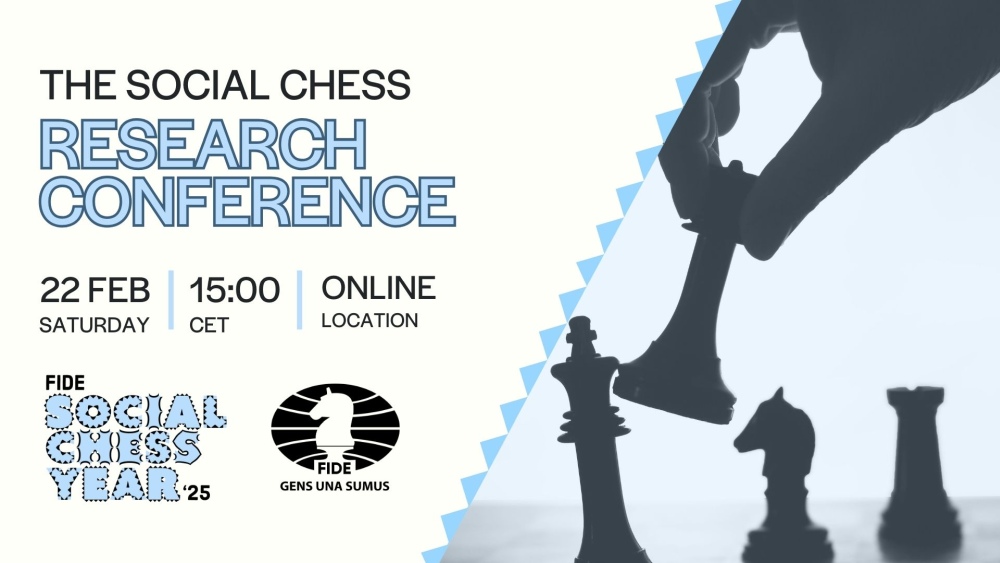
In one of the most comprehensive gatherings of scientists and researchers on the topic of chess, the conference addressed issues such as the role of chess in education and mental recovery. Although chess is widely regarded as a tool for cognitive and personal development, these claims are seldom substantiated by concrete research. With this in mind, the FIDE Social Chess Research Conference—which took place online on February 22—brought together experts in sports and mental health from different health and research institutions worldwide to present their findings and discuss the broader societal role of chess. The conference is part of FIDE’s Social Chess Year initiative, which aims to promote the social value of chess and its importance beyond being just a game, highlighting its role in personal development. Why chess should be considered a sport One of the first issues addressed at the conference was the long-standing debate on whether chess qualifies as a sport. The International Olympic Committee and over 100 countries recognise chess as a sport, though some do not. Prof. Filip Kobiela from the University of Physical Education in Kraków, who has researched the topic, noted that traditional definitions of sport emphasise physical skills, which some argue chess lacks. Kobiela noted that chess demands endurance and quick reflexes—especially in fast formats like blitz—and highlighted chess-boxing as a hybrid of mental and physical competition, challenging ‘narrow definitions of sport’ that overlook chess’s physical aspects. He concluded that a broader, more inclusive definition should consider chess a sport, taking into account its physical elements as well as its institutional recognition by the IOC and numerous countries worldwide. Scientific proof of chess improving cognitive skills One of the key topics discussed at the conference focused on the role of chess in enhancing cognitive skills. Juan Antonio Montero Aleu and Rodrigo Babeito introduced the ECAM Method—a cognitive training approach using chess. The method is applied in various settings, from elderly care to addiction treatment and autism therapy. Its applicability without prior chess knowledge broadens its potential for implementation. According to the researchers, the method aids memory, attention, and executive function training while providing a motivating and engaging way to stimulate the brain. The method is available via the Gym Chess App—a digital version of the ECAM Method featuring over 2,500 exercises designed to train cognitive functions. Speaking specifically on brain and addiction recovery, Prof. Dr. Sabine Vollstädt-Klein from the Central Institute of Mental Health in Mannheim presented her research findings. Her research found that chess enhances cognitive function in both children and older adults, particularly by strengthening their reflective system and improving self-control. It also reduces substance cravings—tested on smokers and individuals with alcohol dependence—and enhances life satisfaction. When chess-based cognitive training was compared to standard treatment, the research found that the chess-infused approach led to greater improvements in attention, executive function, and cognitive flexibility, as well as stronger brain activation in key cognitive areas post-training. The method was integrated with the Gym Chess App and recommends incorporating physical exercise for better cognitive results. Towards future research projects The FIDE Social Chess Research Conference also featured breakout sessions where participants discussed ongoing projects and ideas for future research benefiting chess. Topics included integrating wellness tools for chess and increasing eco-friendly practices and sustainability in chess clubs. FIDE Social Commission Chair Andre Vögtlin thanked the participants of the conference, noting that their contributions are helping chess gain recognition “in the market,” in both the public and private sectors—”as we bring forward concrete evidence of the positive impact of chess on society.”
Chess for Social benefits and Women inclusion Conference set for December 1
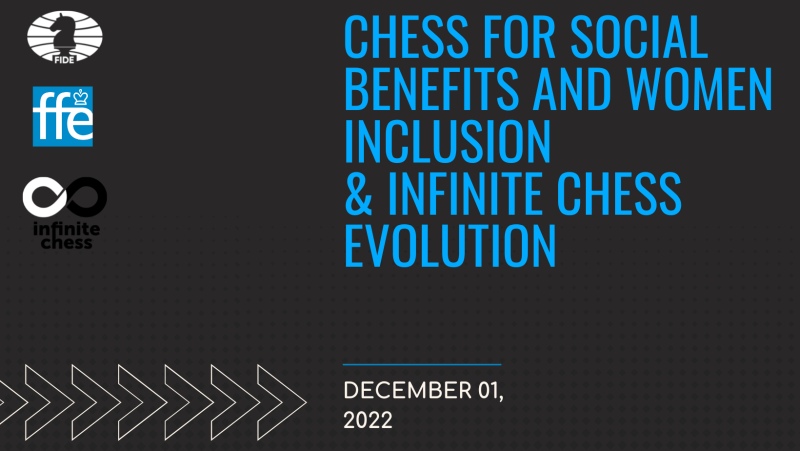
FIDE Social Commission, FIDE Commission for Women’s Chess and French Chess Federation are pleased to announce the “Chess for Social benefits and Women inclusion & INFINITE CHESS Evolution” conference that will take place on December 01, 2022, in Paris, France. The conference will be held in a hybrid format and is open for both offline and online participation. The 4.5-hour event will be devoted to two topics: FIDE, ECU & FFC – Chess for Social benefits and Women & Social in the world: ambitions, projects, trends. Current and new social projects of the International Chess Federation, European Chess Union and French Chess Federation will be presented during the event. Besides, the preliminary results and the evolution of the pilot FIDE INFINITE CHESS Project will be announced. The panel of speakers includes Dana Reizniece-Ozola, Deputy Chair of the FIDE Management Board, Eloi Relange, President of the French Chess Federation, Franck Droin, ECU Social Comission Chairman, President of the Health Social Disability Commission of the FFE, Anastasia Sorokina, Infinite Chess Project Leader, Abhijit Kunte, 4th grandmaster of India, Coordinator of the Chess Social Projects in the Indian Oil Corporation and coach of the Indian National women team. The speakers will exchange experiences and showcase how chess helps people worldwide and make changes for the better. Topics and speakers: WHO Project – Eric Desailly FIDE INFINITE CHESS Project (chess for kids with autism spectrum disorder) – Anastasia Sorokina, Infinite Chess Project Leader, Natalija Popova, member of the ECU Social Commission, author of the FIDE Chess Program for kids with ASD, Ala Mishchanka, author of the FIDE Chess Program for kids with ASD, Special needs educational assistant, more than 15 years of experience (Canada), Researchers from the Chess Research Institute at ASPU named after Kh.Abovyan ICAR Project (International Chess Benefits Assessment Resources) – Franck Droin, ECU Social Commission Chairman, President of the Health Social Disability Commission of the FFE and ICAR Team Leader ECU Social Commission – ECU Social Commission Social trends – Alexandra Weldon, Head of Philanthropy, MOHARI group Prison to Pride: countrywide realisation of the Chess for Prisoners program – Abhijit Kunte, 4th grandmaster of India, Coordinator of the Chess Social Projects in the Indian Oil Corporation, coach of the Indian National women’s team Chess for women in FIDE – Dana Reizniece-Ozola, Deputy Chair of the FIDE Management Board, Anastasia Sorokina, Infinite Chess Project Leader, Anastasiya Karlovych, member of the ECU Social Commission. Chess like a tool for social responsibility – For Coloured Girls, Geraldine Engelman. CUTE: Ukrainian Women Program 2022-2025 – Franck Droin, ECU Social Comission Chairman, President of the Health Social Disability Commission of the FFE, Anastasiya Karlovych, member of the ECU Social Commission Second Brain Project – Virginie Dubois All attendees are required to register for the conference online using this link. You can find the detailed programme of the conference here. If you have any questions, please email them to socialchess@fide.com
Second Intercontinental Online Chess Championship for Prisoners: Registration deadline approaches
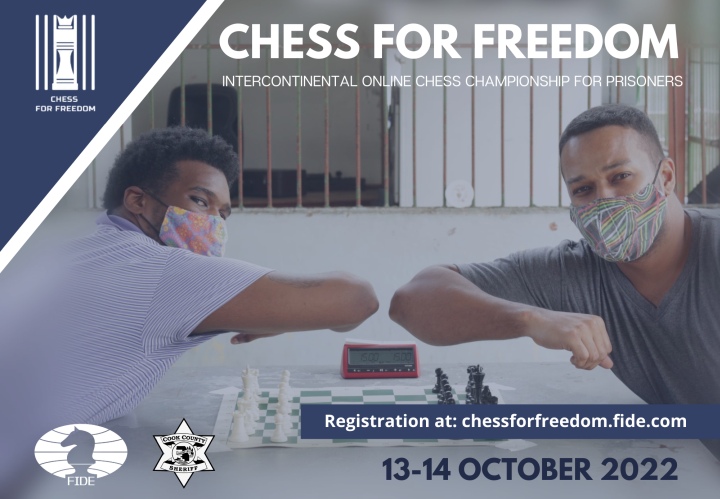
58 teams representing 32 countries have already registered for the second Intercontinental Online Chess Championship for Prisoners, scheduled for October 13-14, 2022, on the International Day of Education in Prison. Correctional facilities for male, female and youth inmates from Argentina, Armenia, Australia, Bosnia and Herzegovina, Bulgaria, Canada, Colombia, Croatia, Czech Republic, Ecuador, El Salvador, England, Georgia, Germany, India, Italy, Kyrgyzstan, Latvia, Mexico, Mongolia, the Netherlands, North Macedonia, Norway, the Philippines, Portugal, Serbia, Slovenia, South Sudan, Spain, Trinidad and Tobago, Turks and Caicos Islands and the USA field their teams made of amateur chess players for whom the game became not just a hobby but strong motivation to change for the better. In some prisons teaching inmates to play chess has been done for many years, in others, the first Intercontinental tournament for prisoners held by FIDE, jointly with Cook County (Chicago) Sheriff’s office in October 2021, gave an impetus to bring chess classes to correctional facilities. The Argentina chess federation (FADA) started its cooperation with SENAF (National Secretariat for Children, Adolescents and Family) in 2021, bringing chess classes to prisons and correctional institutions for children under 18 years of age. Currently, the initiative is implemented in 20 schools for troubled youth throughout the country. “We have noticed that the behaviour of prisoners changed. Sometimes instead of solving their problems and conflicts through violence, they decide to have a game of chess to resolve a dispute,” says Hector Flori, General Coordinator of the project, FADA Secretary. “With a view to this tournament, a national qualifying event was held on September 14, and the winners will receive, in addition to the weekly formal classes of the project, a special training by the teachers of the school of high performance of FADA. It is a great challenge for us to play in this event again.” In addition to the tournament itself, the live broadcast of the championship will include many guests – ambassadors of Chess in Prisons initiatives from different countries, chess teachers for inmates and at-risk communities, ex-convicts whose lives changed after being introduced to chess. One of them is Simosakhe Ngwane from South Africa, an ex-prisoner who learned to play chess while in jail. He came back to normal life and became a role model for many at-risk children in his country. “I hope the program expands into schools as well because that’s where our kids start making mistakes. Even myself. If I’ve learned how to play chess in school, I wouldn’t have made some mistakes in my life,” he says. To make his dream to help youngsters come true, Ngwane organized chess classes for kids in his hometown Molweni. Even though sometimes there are not enough chess boards, clocks and tables for students, the number of kind who want to start playing chess keeps growing. “Crime is easy when you are young. That’s the reality. You don’t think of consequences until it’s too late. Playing chess develops a positive attitude. The simple rule of chess “Touch is a move” brings discipline and calmness. It teaches you to wait, to think, and to prepare before you make a decision,” Ngwane adds. The registration for the second Intercontinental Online Chess Championship for Prisoners is open until September 21, 2022. Participation is free of charge. Tournament regulations (pdf) Registration form
Serbia prepares for second Intercontinental Online Chess Championship for Prisoners
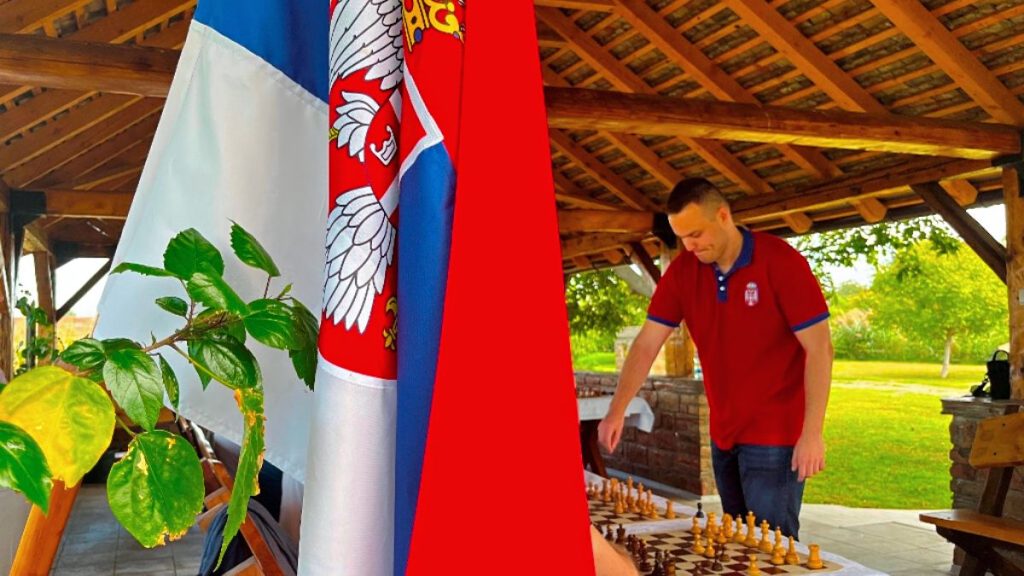
Convicts from Belgrade prison Padinska Skela played a simultaneous exhibition with GM Aleksandar Indjic. Last year, the International Chess Federation, jointly with Cook County (Chicago) Sheriff’s office, launched the project “Chess for Freedom”, which is dedicated to convicted and detained persons worldwide. As a part of it, the Intercontinental Online Chess Championship for Prisoners was organised. Its first edition was supported by 17 national federations, including the Chess Federation of Serbia. The Administration for the Enforcement of Penal Sanctions of the Ministry of Justice of the Republic of Serbia established strong cooperation with several Penal Correctional Facilities in Serbia. Last year, a team of Serbian convicts from the Penal Correctional Facility in Belgrade (Padinska Skela) participated in the very first Intercontinental Online Chess Championship for Prisoners. This year, Serbia will field four teams in the competition: men’s teams from Penal Correctional Facility in Padinska Skela and Zabela Pozarevac, a women’s team representing Penal Correctional Facility for women in Pozarevac and a youth team from Juvenile Reformatory in Krusevac. As part of the preparatory activities, tournaments were held in several penitentiary institutions, and the first board of the Serbian national team, grandmaster Aleksandar Indjic, played a simultaneous exhibition on the premises of the Penal Correctional Facility in Padinska Skela on September 7 2022. The warden of the Penal Correctional Facility, Vladimir Bukvic, wished the simultaneous game participants to give the most vigorous possible resistance to Grandmaster Indjic and use this opportunity to improve their chess skills. On behalf of the Chess Federation of Serbia, Nebojsa Baralic, Chief Advisor to the President of the Serbian Chess Federation and Director of the FIDE Intercontinental Online Chess Championship for Prisoners, expressed his gratitude for the hospitality. He told the attendees about all the activities that have been carried out since the beginning of the project. He also introduced them to the plans of FIDE and Serbia Chess Federation in this field, as well as the organisation of the upcoming Intercontinental Championship. The country’s four largest Penal Correctional Facility – Sremska Mitrovica, Pozarevac (Zabela), Nis and Belgrade have been having chess sections for many years, and all prisons regularly organise tournaments with more than 100 convicts participating. Chess tournaments and numerous sports activities have been regularly organised in the Penal Correctional Facility in Padinska Skela (Belgrade) since last year. The Intercontinental Online Chess Championship for prisoners is open for teams representing any correctional facility. Currently, 45 teams from 23 countries have already registered for the tournament. The registration deadline is September 21, 2022. Participation is free of charge. Tournament regulations (pdf) Registration form
Chess for Refugees project enters its second year
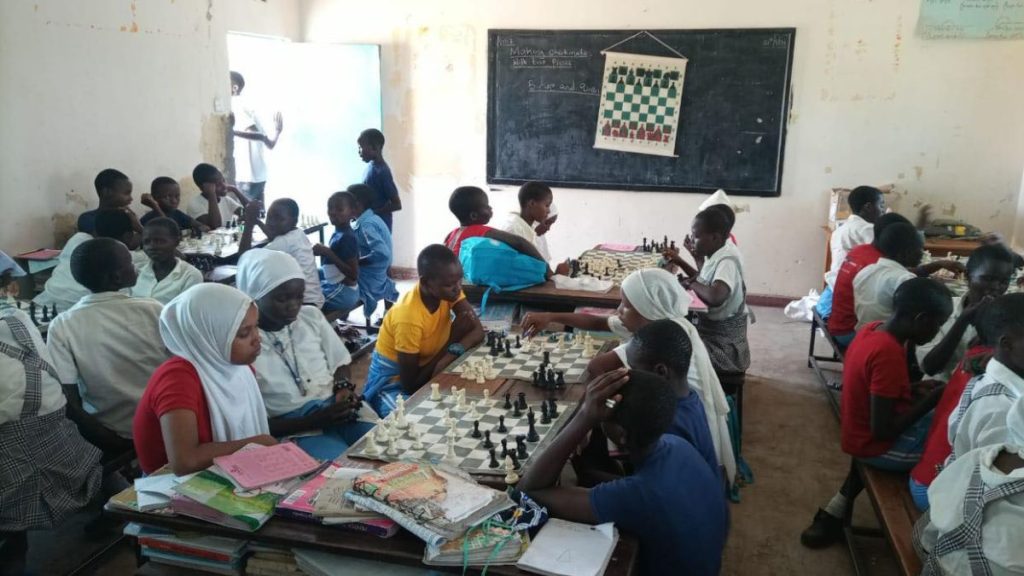
Chess for Refugees — an ongoing FIDE project run in the Northwestern region of Kenia — kicked off in August 2021. Its main activities are located in Kalobeyei refugee settlement, some 15 kilometres west of the main Kakuma camp, established to host unaccompanied minors who had fled the war in Sudan and from camps in Ethiopia. The camp is situated in one of the poorest counties in Kenya. Eight Kalobeyei primary schools participate in the project with 50 learners each, of whom the majority are girls. The Girls Club “Chess for protection” was launched by FIDE and UNHCR as part of the Chess for Refugees programme. Its goal was to offer valuable educational activities to refugee girls who would typically have stayed home to carry out daily chores like cooking and cleaning. The project started in Angelina Jolie primary school in Kakuma with an attendance of 40 students. Now it is run in 3 girls boarding schools in the region, with 150 refugee schoolgirls participating. “The idea of the Girls Club “Chess for protection” was born around two years ago. It is very important for girls in difficult life situations to meet role models and professional chess players and understand how important chess could be in their lives. Through chess, they can learn a lot of interesting things, find new friends, develop their logical thinking and other skills that can be very useful in their lives,” says the leader of the Girls Club “Chess for protection”, WIM Anastasia Sorokina. Female students attend online lessons by WGM Anastasiya Karlovich (UKR) and IM Salome Melia (GEO). Held once a week, these meetings are not only about chess. The vision is not just to improve the chess skills of refugee students but to spur creativity and broaden their horizons. The most important goal is a possibility for these girls to see, communicate and get support from inspiring role models. Through live communication, the project participants have a chance to develop personally and improve their problem-solving and decision-making skills. “They were super excited to be exposed to chess, as they know they will benefit greatly from this game. And they have already experienced these benefits. Some of them were not doing well in mathematics, and after they started attending chess classes, they improved their calculation skills,” says Kong’or Deng Maketh, the leader of chess for Kakuma and Kalobeyei refugee youth project. Another ten schools in Kakuma will join the project later this year. By then, some 1600 children living in refugee camps will have participated and learned to play chess. “The Kakuma and Kalobeyei project is FIDE at its best, with chess at the core of a very meaningful project affecting many young learners, of which a majority are actually girls. It has been great to work with partners like UNHCR, Chess Kenya and the Lutheran World Federation. We are currently working to make the positive impacts sustainable, with chess activity in Kakuma and Kalobeyei to continue also in the years to come,” adds FIDE Social Commission Chairman Geir Nesheim. FIDE believes that education is a key for younger generations to obtain sustainable livelihoods and plan more similar projects in refugee settlements around the world to be launched in the years to come.

